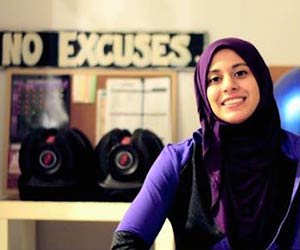
Amina Khan, a PhD in Psychology with a specialization in Health Psychology student and 2017 Scholar of Change, grew up struggling with her health. When she found herself overweight, like many other women, she became frustrated with not finding a weight-loss solution that felt right for her.
“When you feel alone in your weight or health struggles, and there’s a lack of fitness and nutritional information and community support, it can be really hard to find the motivation to make positive changes in your life,” says Khan.
Despite not finding resources in her community, Khan successfully lost 60 pounds. She wanted to help other women in her community who were similarly struggling with their health. To bridge the gap for her community, she became a certified group fitness instructor specialist through canfitpro, Canada’s largest certification organization for fitness professionals, as well as a weight loss coach. She also founded Amanah Fitness, a research-based health education platform for Muslims around the world. “South Asian and Middle Eastern cultures historically have a tendency toward obesogenic foods and practices,” explains Khan. “The community spans multiple ethnicities, and subgroups exist with different levels of health literacy. Until now, there hasn’t really been anything targeted toward this population to address their specific health needs and challenges.”
Khan creates fitness programs that are custom for South Asian and Middle Eastern cultures complete with videos, recipes, research, and other educational materials. “This group of women is often neglected from mainstream media, with a complete lack of relatable fitness role models and programs,” she says. “I hear from many women that they didn’t think fitness was for them because no one looked like them. The lack of relatability has significant impact on motivation and positive body images.” Amanah’s fitness educators wear head scarves and are part of the same culture, which have translated to higher compliance.
“Amanah” is the Arabic word for “trust,” which resonates with Muslims who generally believe their bodies are a precious “trust” from God, as a faith-based approach to motivation. “‘Amanah’ also alludes to the way we create health education, which is very customized to this community. I’ve learned through my Walden education that it’s imperative to tap into cultural-specific reasons for change, and in the case of this faith-based culture, that’s their reason to pursue health,” says Kahn.
Consider Ramadan, the annual month-long observance wherein Muslims fast from dawn to sunset. “During this time, many Muslims don’t understand how their health may be impacted and their eating habits and exercise patterns should change. The neglect,” she adds, “is due to a lack of education. That’s why I’ve created fitness programs based on the latest research on fasting fitness, as well as partnered with doctors and dietitians to identify and share research to promote healthier fasting practices, as well as educate about diabetes during Ramadan.”
While Khan’s goal was originally to help her local community, her reach has expanded globally. Now, more than 50,000 people around the world are learning how to be healthy through Amanah Fitness. “Though most of our members are in Canada and the U.S., we have 14,000 from Pakistan and representation from the U.K., Bangladesh, India, Malaysia, Saudi Arabia, the UAE, and Australia. This truly speaks to the gap where health education is lacking for this population.”
Amanah Fitness has grown quickly since its founding 3 years ago. Amina and her team remain incredibly passionate and committed to growing the platform. “At a fundamental level, we’re talking about knowledge translation, and it’s important that health education is not only easily accessible and simple to use but also understood by the masses.” Future plans for her program include continuing to work with local cultural leaders to create health education change as well as translating the program from English to Urdu and Arabic, with a goal to reach more than 300,000 Muslims around the world.
“I’m grateful to be part of the Walden doctoral program,” says Khan. “Everything I’m doing in my program is within the context of Amanah Fitness. My degree is intertwined with my personal and professional mission to bring health education to my community, and that’s something unique that I wouldn’t get from another program. The fact that my education and my mission to inspire health education are interconnected is absolutely critical to our success. It not only allows us to provide highly effective research-based educational material and programs based on health psychology principles, but also makes my degree very meaningful.”
—Jen Raider



